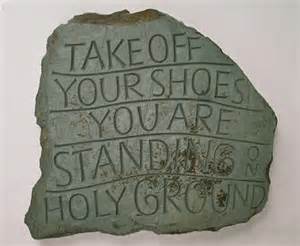What Does the Lord Require of Us?

He hath shewed thee, O man, what is good; and what doth the Lord require of thee, but to do justly, and to love mercy, and to walk humbly with thy God? (Micah 6:8 KJV)
How has God shown us what is good, and what He requires of us? God has revealed and shown us what is good through His Word; through the lens of the Law and the Prophets; through Priests, Judges, and Kings, through Jesus Christ, the Disciples and Apostles; and continuously progressively reveals and shows us through the five-fold ministry gifts and the Body of Christ. King David declared that He searches the hearts and tries the reins. His Commandments are just, and pure and able to produce righteousness, and holiness and He has written them in our hearts, so that we would know and can do justly, and love mercy and walk humbly with Him.
The Bible informs us through and by His Word, under the guidance of His Spirit. God has given us patterns and principles to measure ourselves and actions by. Letting us know that if we judge ourselves, that we would not be judged. The Word of God teaches and instructs us in what God requires from us. Jesus gave us more understanding, giving us parables to contrast our character and behavior, so that we would indeed take self inventory and examine ourselves.
The prophet began this segment and verse with God has shown you O man (woman) what is good, and what does the Lord require of you? After the and in this statement, the word what is ushering in the question? Questions always require answers. Here is where the question begin.... what does the Lord require of you, but to do justly, and to love mercy, and walk humbly with thy God? There is a question mark at the end of the verse, which suggests that the declaration or statement actually ended after the semicolon, and the verse took on a different twist, so to speak. It turned into a provocative instruction. We are provoked to think what we must do. The man and thee are singular and suggest whosoever and personalizes it for everyone.
"All Scripture is given by the inspiration of God, and it is profitable for doctrine, for reproof, for correction, for instruction in righteousness. That the man of God may be perfect, thoroughly furnished unto all good works" (2 Timothy 3:17-18 KJV).
God shows us what is good so that we may be complete and thoroughly become furnished to perform justice because we love His mercy and grace, we in turn make the decision to do the good He shows us. Who is there really that doesn't love receiving mercy? We love the kindness we receive, but do we love and value it enough to extend it to others who may have blown it? You examine you, and to your own self be true, therefore you will be truthful with God and others. Do you love mercy only when you are the recipient? Or does your heart ache for God's mercy for others or His wrath?
Take the parable of the unjust servant for instance. We see a man receive mercy and freedom from a debt, and he goes out finds someone who owes him a debt, collars the man by the throat, and demands payment, but the mercy he received he refused to give. This how he became unjust. The ill regard for mercy once received. If we don't learn from this parable, we are not going to do justly.
Matthew 18:21-35 - King James Version (KJV)
Then came Peter to him, and said, Lord, how oft shall my brother sin against me, and I forgive him? till seven times? Jesus saith unto him, I say not unto thee, Until seven times: but, Until seventy times seven. Therefore is the kingdom of heaven likened unto a certain king, which would take account of his servants. And when he had begun to reckon, one was brought unto him, which owed him ten thousand talents. But forasmuch as he had not to pay, his lord commanded him to be sold, and his wife, and children, and all that he had, and payment to be made. The servant therefore fell down, and worshipped him, saying, Lord, have patience with me, and I will pay thee all. Then the lord of that servant was moved with compassion, and loosed him, and forgave him the debt. But the same servant went out, and found one of his fellowservants, which owed him a hundred pence: and he laid hands on him, and took him by the throat, saying, Pay me that thou owest. And his fellowservant fell down at his feet, and besought him, saying, Have patience with me, and I will pay thee all. And he would not: but went and cast him into prison, till he should pay the debt. So when his fellowservants saw what was done, they were very sorry, and came and told unto their lord all that was done. Then his lord, after that he had called him, said unto him, O thou wicked servant, I forgave thee all that debt, because thou desiredst me: Shouldest not thou also have had compassion on thy fellowservant, even as I had pity on thee? And his lord was wroth, and delivered him to the tormentors, till he should pay all that was due unto him. So likewise shall my heavenly Father do also unto you, if ye from your hearts forgive not every one his brother their trespasses.
When we know because God has told us through His Word and we do not heed His instructions on how to synchronize our intents, motives, desires, thoughts, and actions to do justly, we will not do what He requires of us.
In Revelation 22:11 it says He that is unjust, let him be unjust still. Yet if we know what God requires us to do and it require being just, we won't desire to be unjust but just. This verse is a summation to the attitude behind injustice, let him or her who is unjust be unjust still. We are called to change, and wear our new just garments.

- To do justly
We know why we must do justly, because God requires it. How do we do justly? We must put into practice being fair. To do is an action word and there must be movement and motion involved. Some definitions of justly include fairly, righteously, honestly, honorably, truthfully, and reasonably. Performance of justly takes place in the soul realm. We need our conscience to judge between just and unjust and to choose the just. We need our reasoning to determine whether this is the right decision to make. and that it is right to do justly. All of our decisions are judgment calls and will be the determining factor for being a doer of the word. In this instance, we are counseled to do justly because we have been informed what is good and what the Lord requires of us. This prophet's words brings to mind the apostle's words of being a doer of the word and not a hearer only, and deceiving ourselves. When justice is accomplished in and through us, we unlock the door to mercy and enter in. The scales of justice must be balanced to incorporate mercy.
What does it mean to act justly? It means that the actions must speak louder than words; it means that my actions should be those which exemplify justice. I should be fair and equitable in all my assessments and dealings with others, and possess balance to the point of impartiality. It means that behavior should be reasonable, righteous, honorable, and honest. Doing what is justly leads us to being merciful. God's mercy can clearly be seen through His justice. His mercy endures forever. How about our capacity to be merciful? He is a just God, He makes the sun to shine on the just as well as the unjust. How do we treat the unjust? Are we kind and courteous? Will our choice be to love mercy enough to give it, rather than giving judgment? Only prayer for others will link us to the source of the mercy who we need to draw from, we lift our hearts to receive the mercy we need which is complete.
The Word of God always informs and directs us into what is good. In Mark 10:17, there came one to Jesus to ask Him a question. The man approached Jesus calling Him "Good Master" then proceeded with his question,"what must I do to inherit eternal life"? Jesus asked him, Why calleth thou me good? there is none good but one, that is God. Jesus is the Son of God, and the exact image of God, but did this man really believe that He was indeed God? The point is Jesus directs Him to the Father, who always gives instructions for what is good and what He requires. Jesus told him, you know the commandments, in other words He was saying, you know what is good and what God requires of you. The man answered that he had observed all the commandments since his youth. Jesus beholding him loved him, but when He told him to go and sell all that he had, and to give it to the poor, the man was sad at what was being asked of him, and went away grieved, because he had great possessions. Jesus later in discourse with the disciples told them that it was easier for a camel to go through the eye of a needle, than for a rich man to enter the kingdom of God.

2. To love mercy
Mercy is such a beautiful gift of kindness and we never will fully comprehend all that it entails. To fully understand with our present limitations and finiteness, would be like trying to take the Atlantic Ocean and put it in a tea cup. Hereby we respect the infiniteness of the Living God. Mercy is truly a gift we can all attest to as truth, and be on the same exact page. It is a gift no one can give like God. There are people who are endowed with the special gift of mercy. Only mercy from God's heart grants the breakthroughs, healings and deliverances from bitterness and un-forgiveness needed to experience the peace to walk in mercy.
We love mercy, especially when we are receiving it. It warms our hearts like a sun filled day with rays of kindness that melts the heart unto humility. We learn from mercy, how to walk humbly with God. We know to stay away from the seat of scorn and not to sit there with a gavel, but to give a rose instead and something of beauty. God's mercy endures forever, He will always be merciful. God said...... For he saith to Moses, I will have mercy on whom I will have mercy, and I will have compassion on whom I will have compassion. (Romans 9:15 KJV).
Can you recall your first encounter with the mercy of God? Didn't you love mercy from that day on. Why? Because you received a precious gift that no one can ever give you. The mercy of God is a communicable characteristic that we have access to and are capable of loving and giving to others. We should never be willing to neglect or forget the mercy we have received from God, it keeps us humble and aware of how much others need mercy. The kindness is overwhelming and can quake you to tears. Mercy is backed up by love. King David knew that goodness and mercy would follow him all the days of his life and that he would dwell in the house of the Lord and behold the beauty of God forever.
We as human beings don't do mercy the justice it is due when we choose condemnation, un-forgiveness, strife, gossip and judgment. Judgment will never triumph over mercy, mercy will always win. Our souls have a lot of toxins which have to be cleaned up and emptied off. What we allow to infect our souls will strangle our attempts to be merciful. We must truly love mercy to the point of consistency, which gives us strength and courage. Where does the love for mercy begin? It begins with God, as does everything of value and worth. The verse didn't just counsel us to have mercy, it admonishes us to love mercy. Remember the story of the unjust servant we perused earlier, it informed us of someone who loved receiving mercy, but he didn't love giving it out to someone else who required the same measure of mercy he received, that is what made him unjust and also reveals that he didn't love mercy unless he was the recipient.
Jesus counseled the disciples to.... Be ye therefore merciful, as your Father also is merciful (Luke 6:36 KJV), which sets the stage to reproduce after the image and likeness of God. In the beatitudes He said, Blessed are the merciful: for thy shall obtain mercy (Matthew 5:7 KJV). A merciful heart is a prosperous one. I can visualize the spiritual garments worn, dipped in cleanliness, purity and holiness. Mercy is a holy characteristic.

3. To walk humbly with thy God
Walking humbly speaks of the softness needed to accomplish this goal. Some of the definitions rendered are meekly and respectfully. It means respecting the boundaries set by God and knowing that crossing those boundaries is where or the place that trespasses occur. This is a place where you hear John the Baptist's words to repent. The fullness of his ministry can be heard in one word, repent! He told those he baptized to repent, why? because the kingdom was at hand. The kingdom is always at hand, therefore we must know the language of repentance and to sorrow for every wrong intention, motive, desire, thought, word and action. God teaches us through patterns and principles what is good and how to choose the good. This is the path we come to see that Jesus Christ has borne our grief and carried our sorrow. After we repent and receive cleansing power we agree to walk humbly with our God. King David knew the way to humility, he would ask God to cleanse him and after that create in him a clean heart, knowing that God tries the heart and its reins.
Interestingly, God walked with Adam in the cool of the day, but did Adam choose to walk with God? It is a choice we make to walk with God, and not subliminally tell Him to walk with us. There is a difference, walking with God requires humility. Humility is a kingdom key that opens portals, windows and doors within the kingdom. Repentance is a door we walk through to enter the kingdom so that we can walk humbly with our God. Mercy is granted to us because of the grace and un-merited favor we have been given. Why wouldn't we love mercy? Only an un-repentant and unthankful heart despises mercy. Mercy is beautiful and kind and produces the humility we need to walk softly and quietly before God. Humility's footsteps are like tippy toes. You just don't desire to arouse God's displeasure by being arrogant or proud.
John the Baptist was given this word "repent" to teach us what is required of us and his ministry is revolutionized in this one word, Repent! It is a health producing term and when you do it, and take it seriously, you are using your kingdom key to unlock a great and effectual door. The Baptist's early departure didn't change the facts, but made his life all that God meant it to be and his ministry a reality in how to humbly walk with God through repentance. Repentance always makes me think of cleansing, it is evident why water was used as a symbol of baptism and repentance as the paradigm and standard. Think of the Church world that has embraced baptism from that time to the present. They may have beheaded and murdered John but they could not kill the ministry of baptism and the fruits of repentance. Jesus Himself observed this act as fulfilling all righteousness as He went to John to be baptized, yet without sin. We in turn have hurdles to climb and repentance will pave the way we should and will walk.
Repentance is a privilege we have to walk humbly with God and not to offend Him with character that is unlike Him and beneath who we truly are in Christ Jesus. Moses was told by God to remove his shoes. God told Him what He deemed to be good and what was required of him, that where he was standing was holy ground. Here he was teaching Moses how to walk humbly with Him. Shoes symbolize humanity, and all that covers our feet. Moses had once used these same feet to rise to the ranks in Egypt. God had other plans for him.
God shouldn't have to hear our earthly footsteps or see Egypt written on our shoes. Have you ever noticed how loud some people walk in a pair of shoes? They have what we call a heavy foot, if you hear them walking on a surface, you will also hear the sound it makes as they walk. Then there are those who walk softly, they can sneak up on you, because they have what is called a soft walk. We need balance, steps can be loud and soft. We want to walk humbly and must find that place in our lives. We also should whisper even when our voice is at full volume. Ascertaining and acknowledging that it is our tone that determines what we are articulating.
Tone meaning, our hearts and souls are inspired and set by beatitudes, and we hear the words of the Savior loud and clear, we in turn fix our hearts to be in agreement with the voice of prophecy spoken through the Prophet Micah; to do justly, and to love mercy. and to walk humbly with our God. Whereby we become doers of the Word and not hearers only.








